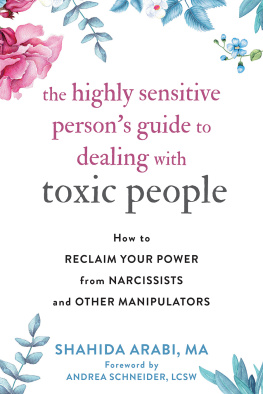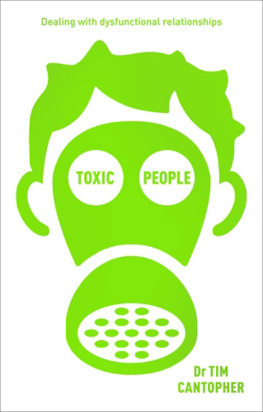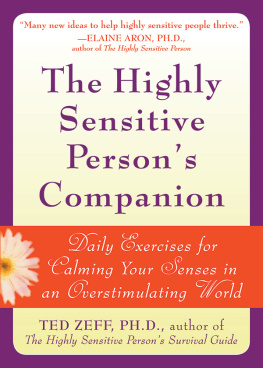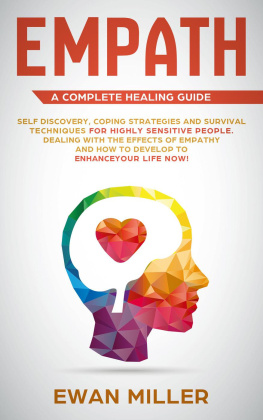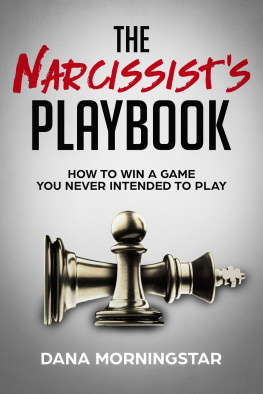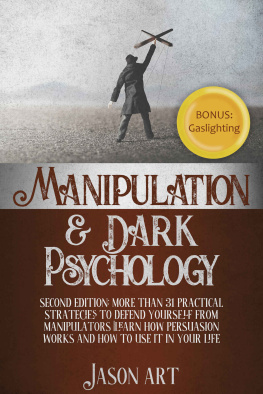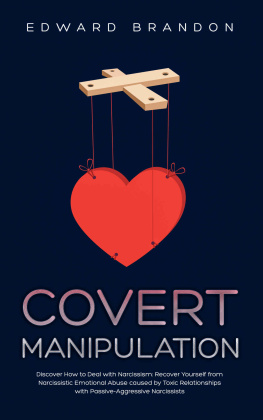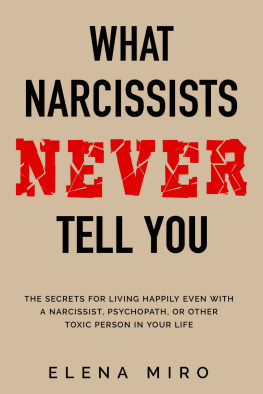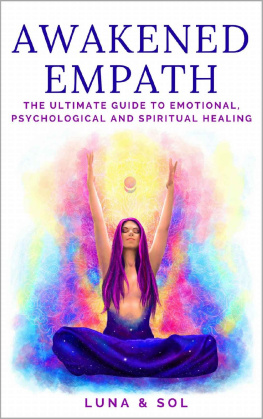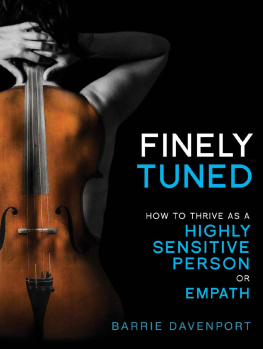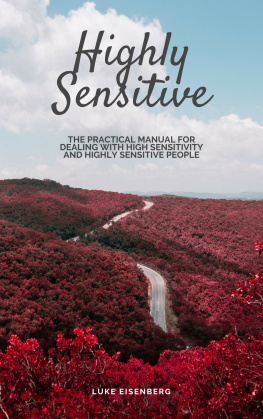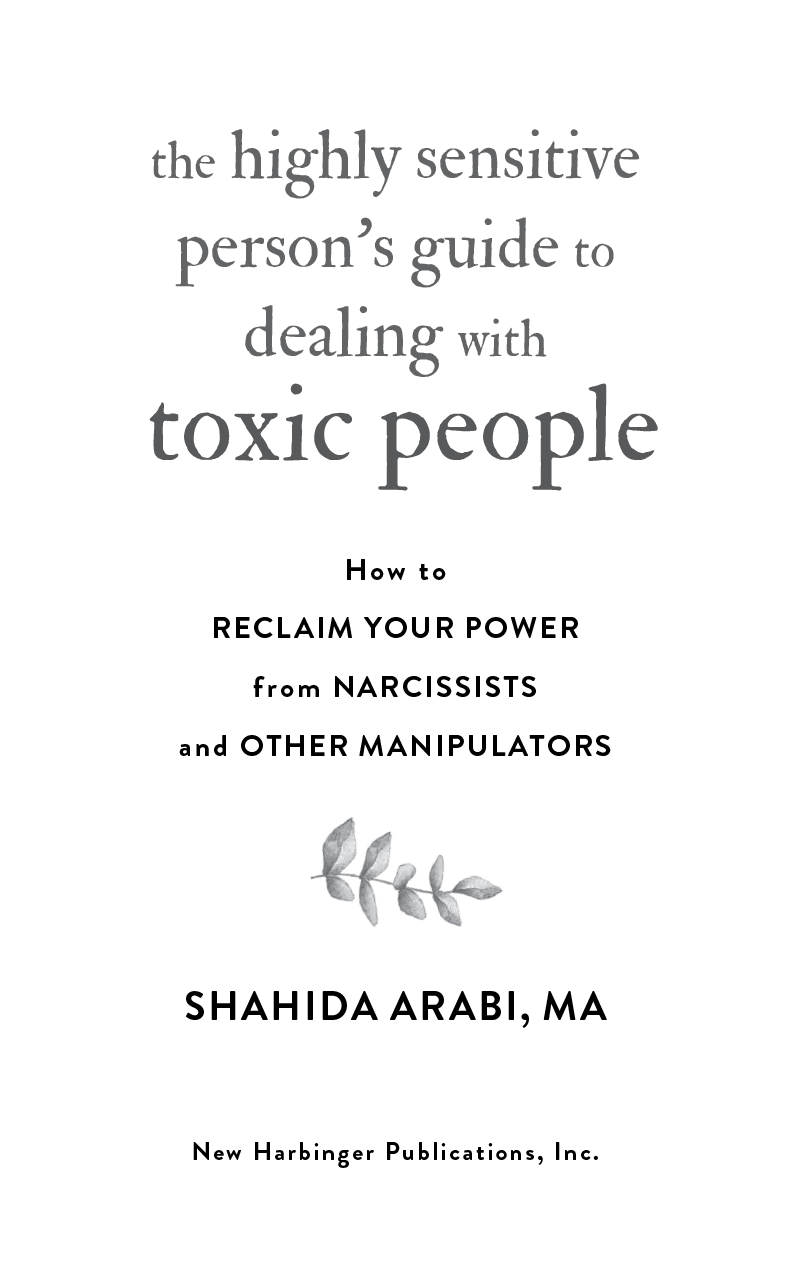With remarkable detail, corroborating science, and content vetted by a therapist, Shahida unravels the mystery of why so many highly sensitive people are vulnerable to the machinations of persons of disturbed character. A must-read for those looking to reclaim their lives and fulfill their true potential.
George Simon, PhD , author of In Sheeps Clothing , Character Disturbance , How Did We End Up Here , and The Judas Syndrome
Outstanding work! Once again, Shahida masterfully blends her own insight and wisdom with evidence-based research and practical strategies for empowering survivors to heal from narcissistic abuse, and effectively disentangle themselves from toxic encounters with individuals that meet criteria for narcissistic or antisocial personality disorders. I regularly recommend Shahidas books to clients in my private practice, and without exception, they emphatically find her writings personally beneficial in multifaceted ways.
Athena Staik, PhD , licensed marriage and family therapist; and author of What a Narcissist Means When He Says I Love You on her www.psychcentral.com blog, Neuroscience and Relationships with Dr. Athena Staik
Another invaluable recovery resource from Shahida Arabi. This book exposes new types of toxic personalities, offers practical advice for protecting yourself, and dives into the hidden strengths that so many survivors share. An essential guide that teaches us how to empower our empathy.
Jackson MacKenzie , author of Psychopath Free and Whole Again
Shahida has become the voice of our generation, a global expert, and a fearless thought leader.
In this book, she not only illuminates the highly sensitive person (HSP) experience, she invites you to nurture your authentic self and discover how to use your superpowers to thrive! If you are sensitive, intuitive, and attuned to the emotions and energy of others, youll learn not only how to become wonderfully emotionally intelligent, but also how to change your life and our world for the better.
Monica M. White, LMHC , licensed mental health counselor
Im a big Shahida fan. Her writing is thoroughly researched, cited, and written in a way that is engaging, witty, and oh-so knowledgeable. This book will help the beginner just realizing what narcissistic abuse is, as well as anyone fully educated and aware. I highly recommend this to therapists, lawyers, judges, and survivors.
Kristin Sunanta Walker , founder of Mental Health News Radio (MHNR) Network: the worlds first podcast network dedicated to mental health, with over twelve million listeners
A must-read for HSPs and for anyone who has ever struggled to understand, handle, and survive toxic people. Shahida has written a book that provides all the answers and information you could ever need in a wonderfully clear, relatable way. This is a book that I wish I had when I was trying to find my way through the minefield of being around toxic people. It will, surely, change lives.
Annie Kaszina, PhD , emotional abuse recovery specialist, and author of Married to Mr. Nasty
Publishers Note
This publication is designed to provide accurate and authoritative information in regard to the subject matter covered. It is sold with the understanding that the publisher is not engaged in rendering psychological, financial, legal, or other professional services. If expert assistance or counseling is needed, the services of a competent professional should be sought.
Distributed in Canada by Raincoast Books
Copyright 2020 by Shahida Arabi
New Harbinger Publications, Inc.
5674 Shattuck Avenue
Oakland, CA 94609
www.newharbinger.com
Cover design by Amy Daniel
Acquired by Jess OBrien
Edited by Cindy Nixon
All Rights Reserved
Library of Congress Cataloging-in-Publication Data
Names: Arabi, Shahida, author.
Title: The highly sensitive persons guide to dealing with toxic people: how to reclaim your power from narcissists and other manipulators / Shahida Arabi.
Description: Oakland, CA: New Harbinger Publications, Inc., [2020] | Includes bibliographical references.
Identifiers: LCCN 2020012135 (print) | LCCN 2020012136 (ebook) | ISBN 9781684035304 (trade paperback) | ISBN 9781684035311 (pdf) | ISBN 9781684035328 (epub)
Subjects: LCSH: Interpersonal conflict. | Psychological abuse. | Manipulative behavior.
Classification: LCC BF637.I48 A73 2020 (print) | LCC BF637.I48 (ebook) | DDC 158.2--dc23
LC record available at https://lccn.loc.gov/2020012135
LC ebook record available at https://lccn.loc.gov/2020012136
Contents
Foreword
Dear Reader,
It is a great honor and privilege to write the foreword for Shahida Arabis new book. Over the last five years, Ive been fortunate to work with Shahida in the field of narcissistic abuse recovery. As a licensed clinical therapist, I have referred clients to her exceptional writing on numerous occasions, as well as her informative and supportive website, to help provide them with validation, research-based tools, and suggestions for recovery.
In this book, Shahida blends research with tangible and practical solutions for empowerment and healing in such a way that is readable, interesting, and applicable. She crafts a medicinal alchemy of fact, compassion, and experiential strategies for survivors of relationship abuse and those encountering toxic people at all points along the toxicity spectrum. If you have been looking for effective approaches to the toxic people in your life, from the benign to the malignant, look no further. You have come to the right place, as the pages that follow are chock-full of evidence-based and strengths-focused nuggets of wisdom. You will also be treated to outstanding recommendations for easy-to-implement strategies on subjects such as boundary-setting, healing modalities, self-care, and coping skills when confronted with toxic people in intimate partner relationships.
Shahidas latest contribution to the field helps highly sensitive people dismantle the effects of addictive abuse cycles and overcome relationship trauma by providing in-depth information and insight about the tactics of psychological abuse, the effects of relational trauma on our brains, and specific strategies on how to best tackle manipulative people. Shahida also beautifully weaves in journaling reflections and exercises throughout the book to further reinforce a survivors newly honed knowledge and apply innovative approaches to healing.
No doubt you have researched numerous articles and scoured websites to find answers to your questions about narcissistic abuse, highly sensitive persons (HSPs), empaths, narcissists, psychopaths, and emotional abuse. HSPs and empaths form a unique and compassionate group of people who are frequently the target of relationship abuse. In this book, Shahida provides a comprehensive analysis of the dynamic between HSPs and toxic people, along with practical ways to create a psychological shield of protection in recovery. She empowers HSPs to tap into their innate superpowers and gifts, which can be true assets in discerning healthy relationships and boundary-setting as healing ensues. I cant think of a more helpful book to recommend to highly sensitive people who want to better understand themselves, know what hit them, learn how to heal, and discover how to move forward into thriving.
My clients in private practice resoundingly state that they appreciate Shahidas wonderful writings, as her style is truly strengths-focused and evidence-based. She knows exactly what a survivor is experiencing and how painful narcissistic abuse recovery can be, which is what allows her work to reach readers in an empathic way while also grounding them firmly in the reality of toxic people and narcissists. She is profoundly aware that survivors often internalize the shame that has been projected upon them from the abusers gaslighting, blame-shifting, and other emotional abuse tactics. She knows they are struggling with the aftermath of the addictive cycle that often develops with manipulators. With that, Shahida works in earnest to express sound, clinically relevant strategies for healing in a nurturing, compassionate manner. Her book reads like a wise friend comforting wounded kindred spirits on the journey of recovery from relationship trauma.

